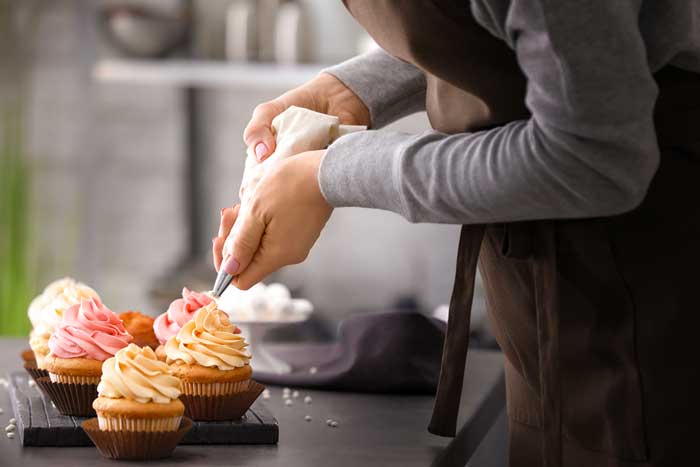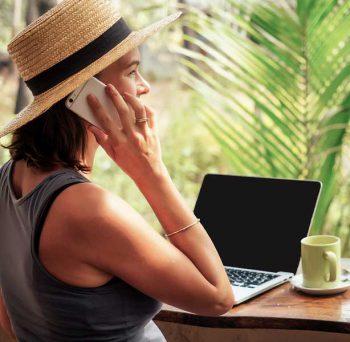
Are you giving freelance work a go?
Your freelancer tax deductions and tax tips are right here!
Whether your video skills are in high demand, your Airtasker gigs have amped up or you are totally nailing it in the cupcake game, this freelancer tax deductions blog will be a massive help to you at tax time.
So let’s start with a few basic tax deductions for freelancers:
Do you work at home?
As a freelancer, it’s likely that some, if not all of your work is done at home. The good news is; whether you work at home full time or not, you can usually claim some of the costs of a home office.
Home office expenses are broken into two types for freelancers
- Occupancy expenses – if you do all of your work from home.
- Running expenses – if you do some of work at home.
Tell me more: Claim your home office expenses and increase your tax refund

Have you spent cash on equipment?
As a freelancer, it’s likely you bought some tools or equipment when you first started out and may have ongoing equipment costs, such as, a camera, laptop, maybe some power tools, accessories or software. In most cases you can claim the cost of these as a deduction.
When and how to claim back your freelance equipment costs:
- Claim tools and equipment up to $1000 in your annual tax return.
- Claim depreciation over a number of years on tools and equipment costing more than $1000.
Safety first – protective items
There is only one of you so you need to look after yourself! Luckily the costs of purchasing, cleaning and repairing work related protective items are on the freelancer tax deduction list.
What to claim:
- Gloves
- Aprons
- Overalls
- Steel capped boots or non slip shoes
- Hard hats
- Hi-vis vests
- Sunglasses and sunscreen (if you work outdoors)
- Goggles or visors
Out and about – car and travel expenses
In many cases, freelance work means you’re out and about during the week. Whether its pitching to new clients or delivering your end products, make sure you’re not out of pocket. Keep a record of all your travel expenses and your personal car use. You may be able to claim tax deductions for car and travel expenses for all your work related journeys.
- Car expenses for work related trips. (Except to and from your usual place of work.)
- Parking
- Tolls
- Taxi fares
- Flights
- Accommodation and meals if you need to stay away from home. For example: if you set up some software in another city and you had to stay overnight.
- Forget about those beers though, you can’t claim those! :(

Staying in touch – mobile phone expenses
Freelancing would be pretty much impossible without your phone keeping you up to date with app requests, emails and client calls. So track and keep a record of what percentage you use it for work over a month.
For instance: Use your phone 45% of the time for work? Include 45% of the cost of your monthly phone plan in you tax return. – Simple.

A boost for Freelancers: Instant Asset Write Off
In the 2024 budget, the Government extended the $20,000 instant asset write-off for small businesses to 30 June 2025.
That means you can claim the full cost of assets you purchased, up to $20,000 each, between 1 July 2024 and 30 June 2025 on this year’s tax return!
What you need to know:
Eligibility: You are eligible if your business has an annual turnover of less than $10 million.
What does Instant Asset Write Off mean? Businesses can deduct the full cost of eligible assets that cost less than $20,000, as long as they are first used or installed between 1 July 2024 and 30 June 2025.
This extension aims to support small businesses by enhancing cash flow and encouraging investment in new equipment.
Not sure whether you can use the Instant Asset Write Off to claim a business expense? Just ask your accountant.
Other tax deductions for freelancers
Superannuation contributions
Make sure you pay into a superannuation fund when you Freelance – there’s no boss to do that for you now! Your super contributions are deducted from your taxable income, so make sure you look after the future you.
Personal Services Income (PSI).
If more than 50% of the income you earn from freelancing is from your knowledge, expertise, skills or labour then the ATO will define your freelance income as Personal Services Income (PSI) This applies to most freelance work and means there are a few other items you might be eligible to claim.
Examples of additional tax deductions for freelancers who earn PSI include:
- Advertising and quoting expenses
- Industry license and registration fees
- Banking and accounting fees
- Relevant insurance and liability fees
Our Tax Tips for Freelancers
Australian Business Number (ABN)
Do you have an ABN? If you don’t, we highly recommend you get one ASAP. You could pay way too much tax if you don’t. A client can withhold 46.5% from payments to you if you don’t have an ABN, so remember to include it on all your invoices.
Keep that receipt!
The need to keep receipts is THE most important thing to remember. It’s the only way you’re ever going to get any cash back from the ATO. From that flash new printer down to that funky notebook you bought in Kiki K. If it’s used for your work as a freelancer, you can usually claim it!
Keep it separate
Open a separate bank account for all your freelance income and expenses. Trust us, it’s far easier to understand your freelance finances if you are not having to paw over statements that include all your personal cash flow as well. With a separate account you can see exactly how you’re doing and what your regular expenses are, as can a bank or broker. This is essential if you apply for a loan down the track. One account for all you freelance work makes tax time a breeze too.
Take advantage of software
Consider accounting software to stay on top of expenses and bills, as well as your outgoing invoices. Accounting software will help you keep your freelance finances structured and in check, meaning you have more time actually earning your cash not trying to work out where it’s all going.
Don’t forget Tax and GST
It’s likely that you’ll need to arrange quarterly pay-as-you-go (PAYG) payments to the ATO for your taxes. If you earn over $4000 from your freelance and pay more that $1000 in tax. PAYG installments spread your tax bill out so you are not lumbered with a lump sum to pay.
You also need to register for Goods and Services Tax (GST) if your freelance income exceeds $75,000 a year. This is another reason you need an ABN. You can’t register for or charge GST with out one.
Talk to a professional
Talk to a tax agent like Etax Accountants to make sure you’re properly registered and that you’re up to speed with your tax and reporting obligations in general. A simple motto when freelancing: “If you’re not sure, ask!”
Download a Tax Checklist for Freelancers
To help jog your memory and collect all the right documents and details for tax time, we’ve created a helpful tax checklist that’s personalised for freelancers.
Have a question or concern, give us a call on 1300 693 829 or email the team on [email protected].





